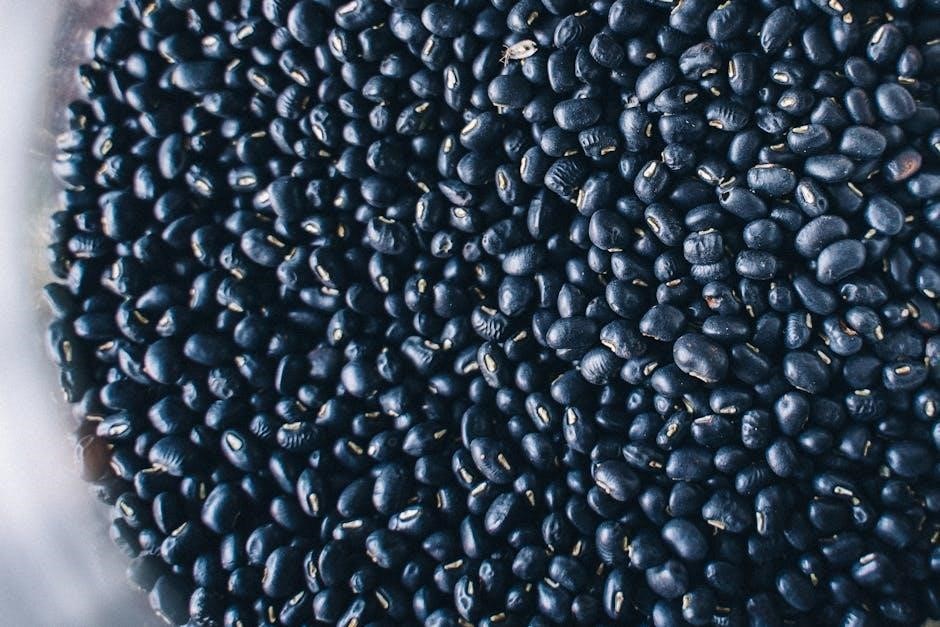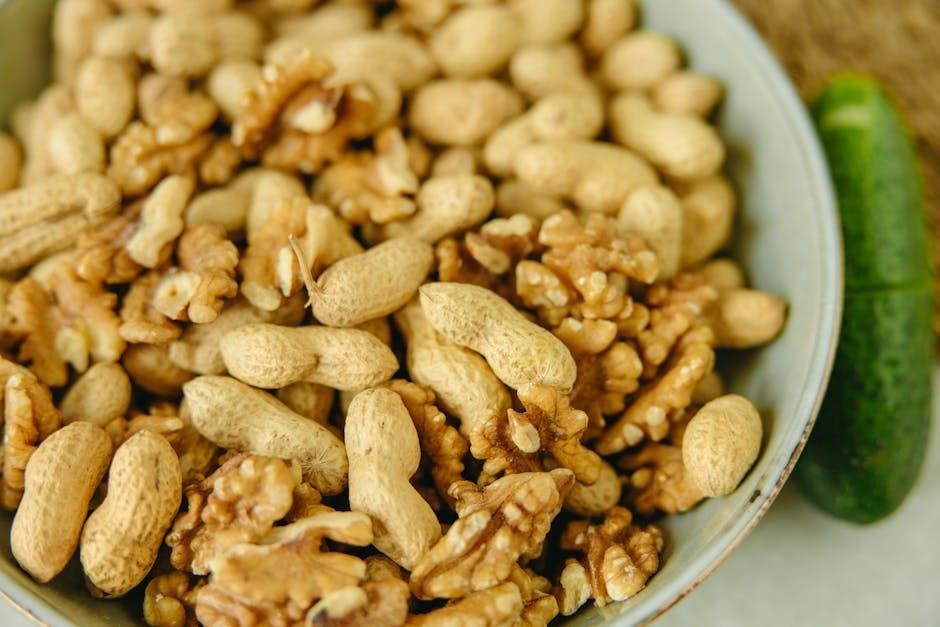Cortisol, often called the “stress hormone,” plays a crucial role in regulating metabolism, immune response, and energy levels. Chronic elevated cortisol levels can lead to weight gain, fatigue, and hormonal imbalances, making it essential to manage through a balanced diet and lifestyle changes.
1.1 Understanding Cortisol: The Stress Hormone
Cortisol, produced by the adrenal glands, is a vital hormone regulating stress response, metabolism, and immune function. It fluctuates naturally, peaking in the morning and dipping at night. Chronic imbalances, whether too high or too low, can disrupt health, leading to issues like weight gain, fatigue, or hormonal dysregulation, emphasizing the need for balanced management.
1.2 The Role of Cortisol in Weight Management and Hormone Balance
Cortisol significantly impacts weight management by influencing fat storage, particularly in the abdominal area, and affecting metabolism. Elevated cortisol levels can disrupt hormone balance, including insulin, testosterone, and leptin, leading to weight gain and metabolic challenges. Managing cortisol through diet and lifestyle is essential for maintaining healthy weight and hormonal equilibrium.

Benefits of a Cortisol Diet Plan
A cortisol diet plan reduces stress, improves sleep, and enhances immune function. It supports weight loss, boosts energy, and helps balance hormones, promoting overall well-being.
2.1 How Reducing Cortisol Levels Can Improve Overall Health
Lowering cortisol levels can enhance sleep quality, boost immune function, and improve energy levels. It also supports weight management and mental clarity, reducing the risk of chronic diseases like diabetes and hypertension. By stabilizing cortisol, the body achieves a balanced metabolism and overall well-being.
- Improves sleep quality and duration.
- Enhances immune system function.
- Supports sustainable weight management.
- Reduces inflammation and oxidative stress.
- Boosts mental clarity and focus.
2.2 The Connection Between Cortisol, Weight Loss, and Energy Levels

High cortisol levels are linked to increased belly fat and weight gain, as cortisol promotes fat storage in the abdominal area. It also disrupts energy balance, leading to fatigue and cravings. Managing cortisol through diet and lifestyle can improve fat metabolism, enhance energy levels, and support sustainable weight loss.
- Excess cortisol promotes abdominal fat storage.
- Cortisol fluctuations can cause energy crashes.
- Lowering cortisol aids in fat metabolism.
- Stable cortisol levels boost sustained energy.

Foods to Include in Your Cortisol-Reducing Diet
Incorporate magnesium-rich greens, omega-3s, and adaptogens to stabilize cortisol levels. These foods support adrenal health and reduce stress hormones, promoting balance and overall well-being.
- Magnesium-rich greens like spinach and kale.
- Fatty fish for omega-3s.
- Adaptogens such as ashwagandha.
3.1 Focus on Whole, Nutrient-Dense Foods
Emphasize whole, nutrient-dense foods to help regulate cortisol levels. Include lean proteins, whole grains, and a variety of colorful vegetables. These foods stabilize blood sugar, reduce inflammation, and provide essential nutrients, supporting adrenal health and overall well-being. Avoid processed and sugary foods that can spike cortisol levels and disrupt hormonal balance.
3.2 Incorporating Magnesium-Rich Greens, Omega-3s, and Adaptogens
Incorporate magnesium-rich greens like spinach and Swiss chard to support adrenal health and reduce stress. Omega-3s from fatty fish and flaxseeds help lower inflammation. Adaptogens, such as ashwagandha, balance cortisol levels and enhance resilience. These foods and herbs work synergistically to promote hormonal equilibrium and mitigate the negative effects of chronic stress on the body.
3.3 The Mediterranean Diet: A Beneficial Approach for Cortisol Management
The Mediterranean diet, rich in vegetables, fruits, whole grains, and healthy fats like olive oil, supports cortisol balance. Its anti-inflammatory properties and focus on whole, nutrient-dense foods help reduce stress hormone fluctuations. Incorporating lean proteins, such as fatty fish, further enhances its benefits, promoting adrenal health and sustainable weight loss while minimizing processed sugars and harmful fats.
Foods to Avoid

High-sugar and processed foods, along with excessive caffeine and alcohol, can disrupt cortisol balance and hinder weight loss efforts, making them crucial to limit in a cortisol diet plan.
4.1 Minimizing High-Sugar and Processed Foods
Consuming high-sugar and processed foods can cause rapid blood sugar spikes, leading to increased cortisol levels and metabolic stress. These foods often lack essential nutrients, promoting inflammation and weight gain. Limiting them is vital for maintaining hormonal balance and supporting overall health in a cortisol-reducing diet plan.
4.2 Limiting Caffeine and Alcohol Consumption
Caffeine and alcohol can disrupt cortisol balance, exacerbating stress and metabolic issues. Excessive caffeine may increase cortisol levels, while alcohol can impair sleep quality, further destabilizing hormones. Moderation is key; reducing intake supports hormonal equilibrium and enhances the effectiveness of a cortisol-reducing diet plan.
Structured Meal Plans for Cortisol Reduction
A 7-Day or 30-Day cortisol detox meal plan provides balanced nutrition, reducing stress hormones. Plans include recipes, shopping lists, and focus on whole foods to promote weight loss and energy balance.
5.1 Sample 7-Day Meal Plan for Hormone Balancing
The 7-Day meal plan focuses on hormone-balancing foods like oatmeal with fruit and nuts for breakfast, grilled chicken with vegetables for lunch, and baked fish for dinner. It emphasizes whole, nutrient-dense foods, including magnesium-rich greens and omega-3s, to support adrenal health and reduce cortisol levels. The plan is designed to be simple and sustainable.
5.2 A 30-Day Cortisol Detox Meal Plan with Recipes and Shopping Lists
This comprehensive 30-day plan includes daily recipes and shopping lists, focusing on anti-inflammatory foods like leafy greens, lean proteins, and healthy fats. It avoids processed sugars, caffeine, and alcohol, supporting adrenal health and cortisol balance. The plan promotes nutrient absorption, reduces stress, and helps maintain hormonal equilibrium for optimal wellness.

Lifestyle Adjustments to Support Cortisol Balance
Managing stress, staying hydrated, and incorporating light exercise are key. Prioritize sleep, daily sunlight, and mindfulness practices to maintain hormonal equilibrium and reduce cortisol fluctuations naturally.
6.1 The Importance of Sleep and Daily Sunlight
Sleep is vital for cortisol regulation, with 7-9 hours nightly recommended. Poor sleep disrupts cortisol rhythms, leading to weight gain and fatigue. Exposure to morning sunlight helps reset your circadian clock, stabilizing cortisol levels and improving energy. Avoid screens before bed to protect sleep quality and maintain hormonal balance.
6.2 Incorporating Light-to-Moderate Exercise
Light-to-moderate exercise, such as yoga or brisk walking, helps reduce cortisol levels while improving mood and energy. Overexertion can spike cortisol, so balancing activity is key. Regular movement supports adrenal health and weight management, complementing a cortisol-focused diet for overall well-being;
6.3 Staying Hydrated and Managing Stress
Adequate hydration supports adrenal function, reducing cortisol spikes. Pairing water intake with stress management techniques like meditation or deep breathing helps maintain hormonal balance. Chronic stress elevates cortisol, so incorporating relaxation practices alongside proper hydration is essential for overall well-being and a successful cortisol diet plan.


Supplements and Support
Supplements like magnesium, omega-3s, and adaptogens such as ashwagandha can help regulate cortisol levels, offering natural support for stress reduction and hormonal balance alongside a cortisol diet plan.
7.1 Optional Supplements for Cortisol Management
Optional supplements like magnesium glycinate, ashwagandha, and omega-3s can support cortisol balance by promoting relaxation, reducing stress, and enhancing adrenal function. These natural aids complement a cortisol diet plan, helping to regulate hormonal responses and improve overall well-being without harsh side effects.
7.2 The Role of Adaptogenic Herbs Like Ashwagandha
Adaptogenic herbs, such as ashwagandha, play a vital role in cortisol management by naturally reducing stress and anxiety. Ashwagandha helps balance cortisol levels, improves sleep quality, and enhances energy, making it a key supplement in a cortisol diet plan for promoting hormonal equilibrium and overall well-being without adverse effects.
Addressing Weight Loss and Belly Fat
Elevated cortisol levels often lead to belly fat accumulation, slowing metabolism and increasing water retention. A cortisol diet plan helps reduce stomach fat and promotes sustainable weight loss.

8.1 How Cortisol Affects Weight Gain and Retention
Cortisol triggers belly fat storage by increasing hunger and fat retention. High cortisol levels slow metabolism, leading to weight gain, particularly around the midsection. This hormonal imbalance disrupts fat-burning processes, making it harder to lose weight and maintain muscle mass, further complicating efforts to achieve a healthy, balanced physique through diet alone.
8.2 Using the Cortisol Diet Plan for Sustainable Weight Loss
A cortisol diet plan focuses on balancing hormones through nutrient-rich foods, reducing inflammation, and stabilizing blood sugar. By incorporating magnesium, omega-3s, and adaptogens, this plan helps lower cortisol, promoting fat loss and energy balance. Sustainable weight loss is achieved through consistent dietary habits, stress management, and lifestyle adjustments that support overall hormonal health and well-being over time.

Frequently Asked Questions
- What can I eat during the cortisol detox? Focus on whole, nutrient-dense foods like greens, omega-3s, and adaptogens.
- Can I drink coffee? Moderate coffee intake is allowed, but be mindful of cortisol spikes.
- What results can I expect? Improved sleep, energy, and weight loss are common outcomes.
- How do I download the free PDF? Click the provided link to access the 21-day cortisol detox plan.
9.1 What to Eat During the Cortisol Detox
Focusing on whole, nutrient-dense foods is key during the cortisol detox. Incorporate magnesium-rich greens, omega-3 fatty acids, and adaptogens like ashwagandha to help regulate cortisol levels; Include lean proteins, healthy fats, and fiber-rich vegetables. Avoid high-sugar and processed foods that can spike cortisol. A structured meal plan with balanced nutrition supports adrenal health and overall well-being.
9.2 Can Coffee Be Consumed During the Detox?
Coffee consumption during the cortisol detox should be approached with caution. While moderate amounts may be permissible, excessive caffeine can disrupt cortisol balance and worsen stress levels. It’s advisable to monitor personal tolerance and consider reducing or eliminating coffee to support adrenal health and maintain stable cortisol levels throughout the detox process.
9.3 Expected Results After the 21-Day Cortisol Detox
Participants often report improved sleep quality, enhanced mood stability, and increased energy levels. The detox helps regulate cortisol, leading to reduced cravings, sharper mental focus, and a more balanced metabolism. Many also experience weight loss and decreased belly fat due to improved hormonal balance and reduced inflammation.
9.4 How to Download the Free 21-Day Cortisol Detox Plan PDF
To access the free 21-Day Cortisol Detox Plan PDF, visit the website and click the download link. Enter your email to receive the comprehensive guide, which includes meal plans, recipes, and lifestyle tips. The PDF is available instantly, offering a structured approach to resetting cortisol levels and improving overall health.
Consistency and awareness are key to managing cortisol. By implementing lifestyle changes and diet adjustments, you can achieve hormonal balance. Download the free PDF for a structured guide to support your journey toward better health and wellness.
10.1 The Importance of Consistency and Awareness
Maintaining consistency in your cortisol-reducing efforts is vital for long-term success. Awareness of how diet, sleep, and stress impact cortisol levels empowers you to make informed choices. By staying committed and mindful, you can sustain hormonal balance and overall well-being, ensuring the benefits of your cortisol diet plan endure.
10.2 Final Tips for Managing Cortisol and Achieving Balance
Combine a balanced diet with lifestyle habits like sufficient sleep and hydration. Focus on whole, nutrient-dense foods, including magnesium-rich greens and omega-3s, to help regulate cortisol. Incorporate adaptogens and practice mindfulness or meditation to reduce stress. Consistency in these practices will lead to sustainable hormonal balance and overall well-being.
